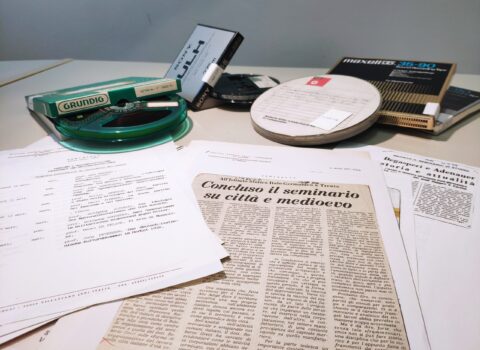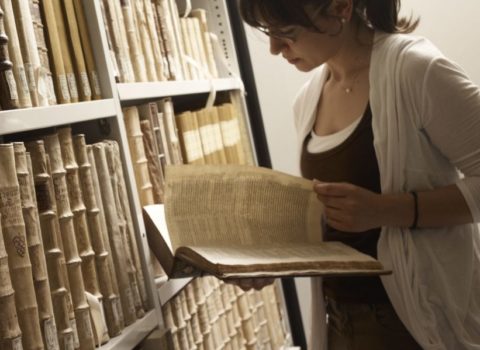
Digitizing correctly, digitizing everything
Our civilian service experience at the FBK Library
In September 2024, our Civilian Service experience began at the Fondazione Bruno Kessler (FBK) Library in Trento. We took part in the fourth edition of the project “Digitalizzare bene. Digitalizzare tutto: Accesso alla ricerca umanistica per tuttə”.
Our year-long project, which will conclude on August 31, 2025, focused on digitizing and cataloguing audio recordings from seminars, conferences, and cultural events organized by the Trentino Institute of Culture (which later became FBK) and its research centers—particularly the Italian-German Historical Institute (ISIG) and the Institute for Religious Studies (ISR)—dating from the 1980s to the early 2000s.

The work involved several operational phases, all aimed at preserving and enhancing a sound archive of historical and cultural significance. We worked with audio reels and cassette tapes—using a Revox recorder for the former (a high-fidelity professional analog device) and cassette players connected to digital audio interfaces for the latter. The audio content was transferred to computers and processed using Audacity software, which enabled not only digitization but also enhancement of sound quality (normalization, editing, noise reduction), thus supporting accurate transcription and online storage.
Once digitized, the audio files were described, tagged with metadata, and uploaded to the open-access platform Internet Archive, in a section dedicated to the Civilian Service project hosting the Digital Archive of Conference Recordings.

All digitized materials are also accessible and searchable through the Library’s website (https://biblio.fbk.eu/nuovavoce/). This entire process was carried out under the constant guidance of the Library Director, Matteo Fadini, who supported us in methodological choices and in the proper use of archival platforms.
Our experience was also formally recognized by the Franco Demarchi Foundation as part of the certification of skills acquired through non-formal learning programs.
On a personal level, we believe this project provided us with a concrete opportunity for professional development in the fields of archiving and library management. It allowed us to apply and deepen our humanities background in a highly qualified setting such as FBK. The work environment stood out for its inclusiveness, availability, and professional skills—qualities that are increasingly rare, yet essential for a meaningful and educational professional experience.
In conclusion, this journey has equipped us with valuable tools for entering the post-graduate job market while also strengthening our sense of civic duty in preserving and making accessible the cultural memory of Italian and European research.





